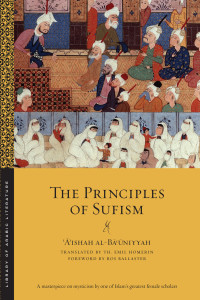A Guest Post by Aisha Subhan
 A few years ago when I began searching for a topic for my master’s thesis, I explored various subjects and figures in Sufism, as Sufism is my main scholarly (and non-scholarly!) interest. During my search, I stumbled across the works of ʿĀʾishah al-Bāʿūniyyah (d. 923/1517), a female Sufi of Damascus. Thanks to Emil Homerin (1955-2020), who worked tirelessly to provide beautiful and rich translations and a biography of ʿĀʾishah al-Bāʿūniyyah, we are left with a tremendous legacy. In reading these works, I delighted in A’ishah’s poetics of love, her basking in mystical joy, and her feminine version of divine union. Filling a void in my study of Sufism both academically and spiritually, ʿĀʾishah was the female voice and guide that I had been waiting for.
A few years ago when I began searching for a topic for my master’s thesis, I explored various subjects and figures in Sufism, as Sufism is my main scholarly (and non-scholarly!) interest. During my search, I stumbled across the works of ʿĀʾishah al-Bāʿūniyyah (d. 923/1517), a female Sufi of Damascus. Thanks to Emil Homerin (1955-2020), who worked tirelessly to provide beautiful and rich translations and a biography of ʿĀʾishah al-Bāʿūniyyah, we are left with a tremendous legacy. In reading these works, I delighted in A’ishah’s poetics of love, her basking in mystical joy, and her feminine version of divine union. Filling a void in my study of Sufism both academically and spiritually, ʿĀʾishah was the female voice and guide that I had been waiting for.
My journey with ʿĀʾishah al-Bāʿūniyyah began with her Principles of Sufism. Intended as a book for spiritual seekers, The Principles of Sufism provides selected quotations from various Sufis, Quranic verses, and Prophetic sayings along with some of ʿĀʾishah’s own divinely inspired writings. As a Sufi-oriented seeker myself, I welcomed the advice and guidance of ʿĀʾishah al-Bāʿūniyyah on my own spiritual path. My spiritual wayfaring and its process mirrored ʿĀʾishah’s core principles: repentance (tawbah), sincerity (ikhlāṣ), remembrance (dhikr), and love (maḥabbah). Through her presentation of these principles, ʿĀʾishah led me on a journey that evoked new reflections, epiphanies, and mystical experiences.
To Repent Is to Return
My reading of ʿĀʾishah al-Bāʿūniyyah largely took place during the pandemic. Having just moved back to the US with my partner who was a new immigrant, I found myself forced to settle down in a world far from normal. Government office closures delayed the immigration process, ultimately resulting in job insecurity. Amid such uncertainty, I found myself unsure of where to turn, until ʿĀʾishah’s understanding of tawbah or repentance offered me clarity and solace.
According to ʿĀʾishah, tawbah really means “to return.” As we account for our shortcomings and lapses, we are returning to God. Repentance requires both inward and outward application: our outward actions must conform to the inner turning of our hearts. If it is mercy and forgiveness we desire, we too must imbue ourselves with such traits and treat others accordingly. Similarly, if it is mercy that we seek, we will indeed be met with the All-Merciful. In our returning, we awaken to a reality that has always been—that divine Mercy embraces all things. In life, yes, we are always turning, always returning to realize our primordial reality, our celestial possibility, our fiṭrah. Perhaps there will be a time where we are no longer in a state of returning but one of arrival where our souls, light like air, return to the All-Merciful Breath. I now know wherever I turn and when I return, mercy awaits.
Sincerity as Unity
Following repentance, one must cultivate a foundation of sincerity or ikhlāṣ. (Ikhlāṣ is also the name of a chapter of the Quran that speaks to the oneness of God. Accordingly, ikhlāṣ also connotes unity, humility, and truthfulness.) Ikhlāṣ is both an inward demeanor and an outward mark of faith. Instilling sincerity within and acting with sincerity require a recognition of the oneness of God: “it is to devote oneself to seek and obey the True Reality alone.”
 I have tried to take steps towards this reality through an inner journey of transformation and evolution. Quoting an unnamed Sufi, ʿĀʾishah writes, “if you sincerely seek God, He will give you a mirror in which to consider everything.” With this mirror, I began to contemplate the depths and intricacies of my own self and took the first steps of an arduous journey inward. Identifying the limitations of my nafs (“lower self”) and the nafs’ self-centered nature, I sought a new level of consciousness that required inner work. This process is sometimes painful as “sincerity is red sulfur” that transforms base metals into gold, as ʿĀʾishah writes. These flames, this alchemic secret, burn those barriers within, yet through this burning comes purification. I reminded myself not to despair. ʿĀʾishah also teaches that “sincerity is water that causes the tiny seeds of a good deed to grow.” Like a tranquil stream, sincerity uplifts and nurtures even the tiniest of good efforts. This comforting image of nature evokes God’s compassion and the divine feminine in Islam. With the help of divine grace, my sincere strides garnered grander and sweeter and fruits.
I have tried to take steps towards this reality through an inner journey of transformation and evolution. Quoting an unnamed Sufi, ʿĀʾishah writes, “if you sincerely seek God, He will give you a mirror in which to consider everything.” With this mirror, I began to contemplate the depths and intricacies of my own self and took the first steps of an arduous journey inward. Identifying the limitations of my nafs (“lower self”) and the nafs’ self-centered nature, I sought a new level of consciousness that required inner work. This process is sometimes painful as “sincerity is red sulfur” that transforms base metals into gold, as ʿĀʾishah writes. These flames, this alchemic secret, burn those barriers within, yet through this burning comes purification. I reminded myself not to despair. ʿĀʾishah also teaches that “sincerity is water that causes the tiny seeds of a good deed to grow.” Like a tranquil stream, sincerity uplifts and nurtures even the tiniest of good efforts. This comforting image of nature evokes God’s compassion and the divine feminine in Islam. With the help of divine grace, my sincere strides garnered grander and sweeter and fruits.
Dhikr: Nourishment for the Heart
To instill such sincerity in the heart, ʿĀʾishah recommends the practice of dhikr, the remembrance or invocation of God. Following in the footsteps of the prophet Muhammad, ʿĀʾishah’s favorite invocation was lā ilāha illā allāh meaning “there is no deity but God.” I decided to practice dhikr with ʿĀʾishah’s inspiration in mind and heart. In reciting lā ilāha illā allāh, I began to taste the meaning of ʿĀʾishah’s words. With each invocation, I felt connected to my breath, my heart widening, and my body and mind feeling sudden ease and relief. I felt both cleansed and nourished as if God truly resides in the heart. As I continued, all around me seemed to disappear. It was a beautiful reminder, one felt and tasted through experience, that when all else fades, God remains.
“Love Is an Ocean without a Shore”
Just as dhikr reminds us to relinquish our selfish desire, love too is a powerful force towards unity and recognizing the Oneness of God. In her chapter on love, ʿĀʾishah documents the experiences of several Sufis submerged in divine love. This love is one of longing, passion, and desires for divine union and intimacy. To love the divine is to long for the Beloved; it is to experience a fire of the heart in which only sweet sips of love’s wine, the light of God, may extinguish its flames.
 ʿĀʾishah describes such love in the following terms: “I see love, an ocean without a shore / if you are love’s worthy one, dive in! / Stay there / until you drown in its depths, for there is no existence without love.”
ʿĀʾishah describes such love in the following terms: “I see love, an ocean without a shore / if you are love’s worthy one, dive in! / Stay there / until you drown in its depths, for there is no existence without love.”
I realized Love is that unifying force capable of delivering me towards divine union and a true recognition of His Oneness. I am recognizing this love is the path and its efforts, the beginning and the end, the subject and the goal, the lover and the Beloved. I have felt this love upon the heart like an ocean overflowed. In taking ʿĀʾishah as a guide, I hope to drown in this ocean, surrendering to the divine’s immense love and becoming one with its eternal embrace.
ʿĀʾishah’s contributions in The Principles of Sufism come from the heart, and the quotations she provides were selected with purpose and intention. It is a guidebook for all spiritual seekers, in all stations. ʿĀʾishah reminds me of God’s mercy, immanence, and beauty: characteristics of the divine feminine in Islam. She gives me comfort and inspiration; foundation and revelation. The Principles of Sufism is a great contribution to Sufi literature, a masterful text attributed to a prolific female scholar, and a profound spiritual guidebook. In reading, follow in the footsteps of ʿĀʾishah al-Ba’uniyyah, and in doing so, know that love will be your guide.
—
Aisha Subhan is a PhD student at the Chicago Theological Seminary in Islamic and Interreligious studies.

